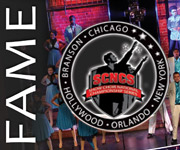
Beyond that analogy, the broader phrasing for “show choir family” encompasses everyone involved in the show choir community, which includes the fundraising companies who help performers reach their financial goals and keep music programs afloat. It’s not at all surprising, then, that so many of the fundraising companies that support show choir via this magazine are from family-owned businesses that share the same values: loyalty, respect, and connectedness.
Creating Financial Rewards from Positive Emotional Energy
Jeff Ellenberger, with Dutch Mill Bulbs, explains that personal attention to each customer’s needs is what makes a small business special, and what gives small businesses advantages over conglomerates. Ellenberger explains, “Customer loyalty is earned, not taken for granted.” That’s why they run their company in a way that makes each customer feel both important and appreciated.
While the overall goal is, of course, helping customers meet fundraising goals, the difference is that they treat an order for 25 items with the same level of importance they would treat an order of 2500 items. He adds, “We do our best to impress with attention to detail and specific needs.”
Ellenberger explains that the same values driving their family are what drives their company, with loyalty, fairness, and honesty as the keys in both everyday life and in business. He’s seen that if people are treated with respect, loyalty develops in a natural way. Ellenberger adds, “Owning a small business is like having a second family. Because you work closely with a small group of employees, day in and day out, there’s a personal connection that I’m not sure exists in larger companies.”
As the father of three sons who are active in school, Ellenberger has seen these relationships as they are built among boosters. He explains that people working together, whether they are members of a small business or performers in a show choir, develop an emotional connection that comes as a result of moving toward a common goal. He adds, “Obviously, positive emotional energy creates financial rewards.”
Demonstrating Understanding, Patience, and Respect
Melissa Geatches, with Country Meats, explains that they have direct contact with their customers on a regular basis, treating clients as though they are part of their own family, a tenet of the company since its inception. Geatches explains, “When we give that personal touch, we see an immediate response in how our customers feel about our company.”
Geatches goes on to explain that when you have a company filled with family members, you must demonstrate constant understanding, patience, and respect: those principles carry over to their interactions with employees and with their customers, and she believes people can feel the difference in their company.
“All of us here have children who are involved in some sort of extra-curricular activity.” Geatches adds, “We understand the level of commitment that parents and volunteers have as well as the youth members involved.” They also recognize the hard work for everyone involved, including setting aside time to practice, to attend competitions, and the required funding to afford participation. Because of those realizations, they have taken the time to create something that is both profitable and easy.
Working with Integrity and Honesty
Debbie Hohman, the founder of School Spirit Coffee, describes the connection in this way: “I have friends all over the U.S. who I have never met.” Because Hohman runs a small, family-owned business, she takes the time to share in her customers’ lives. Hohman notes that their personal family values guide the values of their business as well: “integrity, honesty, and caring for others.”
In fact, having been the “professional booster Mom” of every group her daughters were involved in is what inspired Hohman to start her company in the first place. Hohman also wanted to develop a product where the company does not hire representatives who make profit on the product.
Instead, she wanted half of the profit going directly to the fundraisers. She’s seen firsthand the difference it makes when students have fundraising goals to hit if they can keep half the profits, and she knows that this is one way to create the loyal customer base any company wants to earn.
Keeping it Simple
Finally, Charles Grosse—the founder of CGMG Enterprises, LLC—has recently learned about how emotionally satisfying helping others with fundraising can be. Though Grosse had retired very young and was spending time around the house for the last two years, his wife encouraged him to find something to keep himself busy, and he bought the Lucas Battery name and worked with a connection he’d developed before retirement to develop a battery that was better than the brand names but could be sold at a fraction of that cost. His wife’s tennis partner is the one who suggested that batteries could make a terrific fundraising product, as they are something everyone— from individuals to small business owners— need on a regular basis.
After a week of research, Grosse was ready to begin the fundraising arm of his business, and that has quickly turned into the best part of his job. He notes that helping a choir student from Atlanta raise the money to be part of the Macy’s Day Parade in New York City is “a lot more enjoyable” than working with traditional retailers. Just like in his family, the mantra for his business is about “keeping it simple,” and he worked to quickly develop a plan that allowed for maximum flexibility so a show choir can market how it wants and when it wants, whether it be a focused event or a year-round webpage.
As the father of two daughters who were heavily involved in dance, Grosse is also familiar with the constant costs associated with any creative extra-curricular activity, from costuming to travel. He feels satisfaction on an emotional level when he is able to help a small organization meet a fundraising goal or assist a larger organization that is within an economically disadvantaged area.
Though it’s a business, Grosse explains, it’s also something that helps the school, the student, and the organization. As such, the people at the center of every fundraising project are always front and center. Grosse concludes, “The way we run our family is the way we run our fundraisers.”











